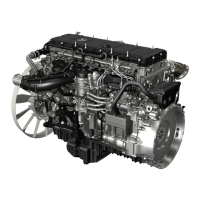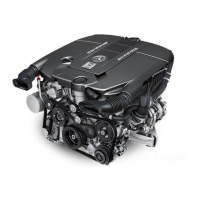Checking for leaks and general condi-
tion – assemblies
X
Carry out a visual inspection of the engine
for signs
of leaks. Slight dampness around
sealed joints can be ignored.
!
More severe leaks, where there is con-
stant oil loss, must be rectified immedi-
ately.
Lines, hoses and sensor cables –
checking for
leaks and general condi-
tion
X
Carry out a visual check for leaks from lines
and hoses.
At the same time, check that all
lines and hoses are undamaged, are routed
so they do not chafe and are secured cor-
rectly.
X
Check the intake pipe between the air filter
and the engine for leaks and check the con-
dition.
X
Check the intake pipe and bellows from the
air filter as well as the charge-air cooler for
the engine for damage and for leaks at con-
nection points.
X
Check the air compressor intake pipe and
crankcase ventilation for damage and leaks
at connection points.
X
Check all hose clamps for correct seating.
Retighten or replace loose hose clamps.
X
Replace porous, leaking or damaged lines
and bellows.
G
WARNING
The engine becomes very hot while it is run-
ning
and
remains so for some time after it has
stopped. It will cause burns if touched.
Before starting any work on the engine, allow
all engine parts to cool down, or wear suitable
gloves and items of clothing to protect your-
self from being burned on hot engine compo-
nents.
G
WARNING
There is a danger of limbs being caught, pulled
in
and
thereby crushed or severed by rotating
engine parts. Therefore you should:
R
keep a safe distance between yourself and
rotating engine parts, including when the
engine is being started.
R
wait until all engine parts have stopped
moving before carrying out any work on the
engine.
R
wear work clothing which is properly fas-
tened and close-fitting. Wear a hair net if
necessary. Remove jewellery such as
watches and necklaces.
Work schedules
77
Notes on maintenance
Z

